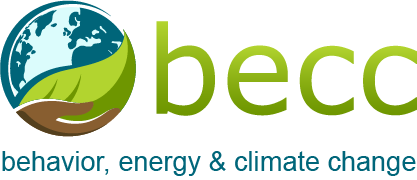The world climate crisis demands all hands on deck, and that includes us. Calling all behavior analysts… We’ve had the science and technology needed to address the climate crisis for years. (I studied solar engineering in the 1970s, for goodness’s sake.) But the science and tech don’t help if they don’t get implemented: This is a *behavioral* problem. Behavioral angles abound, for both climate obstacles and climate solutions.
Behavior analysis, then, has a lot to contribute. Indeed, most specialty areas in the behavioral and social sciences do. Years ago, after my book tour for The Science of Consequences, I decided to work full time on climate change. I was delighted to discover the Behavior, Energy, & Climate Change (BECC) conference, and I’ve now attended eight of these highly interdisciplinary meetings. How do we transition away from fossil fuels? Where are we succeeding, and where are we too slow? What’s new, what can we do, and here’s the data… Let me provide a bit of an intro, to try to interest some of you in giving this conference a try.

Pre-covid, BECC was attracting 500 or more, people in a wide range of disciplines, not just the many behavioral and social sciences: natural scientists and engineers, even journalists and artists. Affiliations are also always wide-ranging: consulting, industry, utilities, nonprofits, business, government, academia. Everyone gets the urgency, and the result is a willingness to surmount disciplinary boundaries that doesn’t always happen in other conferences. It’s exhilarating. Just hearing about successful projects and other progress is empowering. The brainstorming is exciting and productive.
High-profile speakers have included Senator Sheldon Whitehouse, Nudge coauthor Cass Sunstein, Michael Pollan of The Omnivore’s Dilemma fame, and Doug McKenzie-Mohr, author of the classic book Fostering Sustainable Behavior. (McKenzie-Mohr was a BF Skinner speaker at ABAI in 2023.) BECC has also hosted the organizers of reality TV shows with energy competitions – great fun – and gamification experts with programs like Green Ninja (that one for middle-schoolers) – also great fun. I am always surprised at the number of sustainability apps out there… Film Nites share funny and effective ads and public service announcements. The participatory “Solutions” sessions let everyone brainstorm about real-world problems like phasing out gas stoves and creating drought-tolerant gardens.
At the last BECC in 2023, behavior analysts Tony Biglan, Tiffany Dubuc, and Julia Fiebig presented a workshop, and there’s been a number of other behavior-analytic talks. I’ve given three myself: on the role of basic learning principles in sustainability projects, on ways to achieve maintenance (called persistence in this area), and on a guidebook I coauthored several chapters for, Making Shift Happen: Designing for Successful Environmental Behavior Change.
Really, there are way too many BECC highlights to name! And of course there’s the invaluable networking and new friendships. A barrier is, unfortunately, the conference’s expense (except for students). But there’s nothing like chatting about sustainability over dinner to evoke brainstorming and support, so these events are built into the schedule at no extra charge.
For years, BECC met annually, alternating between the US East and West coasts. To cut greenhouse gas emissions, as of 2023, BECC is now biannual, meeting odd years only, and always in Sacramento, CA. I was disappointed, but I understand the rationale. The next conference will be Nov. 2-5, 2025. I will be there.
Since 2016, my first year at BECC, the most behavior analysts who’ve attended a particular conference has been five, and most years it’s only two or three. Can we do better? There’s a lot at stake.
